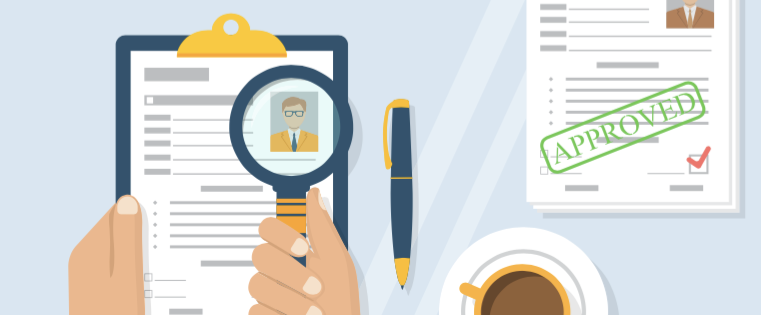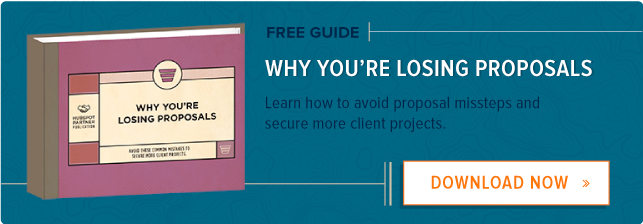
I’ve been writing proposals for over a decade, and it’s probably fair to say that I loathed the entire process for the longest time. I worried that I was just “making it all up.” I’d second guess every word I wrote, and of course, I was petrified of the inevitable rejection. Unfortunately, many creative folks feel the same: “If I’m not a veritable Shakespeare with the quill and ink, then I don’t stand a chance”.
Fortunately, this simply isn’t true.
Over time I came to realize that my writing prowess wasn’t the deciding factor in winning projects. Actually, 90% of my proposals were accepted because of something much simpler: prospect interviews.
Proposals Start Way Before You Propose
I still remember getting those “dear designer” emails. You know the type: The ones where the sender swaps out your name before sending to another 20 agencies. Upon receiving one of these, I’d get over-excited and jump straight into proposal mode. After all, I had all the information I needed in their initial email: They needed a website!
Of course, this is a poor way to find great clients and an even worse way to win meaningful work.
To consistently win projects, you need to invest time in learning about your clients and their problems. But this creates a dilemma: Should you invest time upfront before writing a project proposal? That all depends on if the payoff will be worth it.
If you're going to spend the time writing the proposal, then you should commit to spending the time to discover what your clients really want.
Why You’re Not Winning Enough Proposals
So let’s take a quick look at some of the reasons a project proposal might fail in the first place:
- You were one on a list of many, and the client was just looking for the best price. (This is not a good client anyway.)
- You only spoke about your skills and all the great things you’ve done with them. You failed to mention how you can specifically help the client. This can loosely be seen in many proposals as: web design = $15,000. Where’s the value?
- You sent off a veritable novel of a proposal. No one is ever going to read your 50-page masterpiece. Ever. During the past two and a half years of growing Nusii, we’ve seen that more than 80% of accepted proposals contain between 5 and 8 sections or pages. That’s a quick read in anyone’s book.
- You wrote a shoddy proposal. It happens; you’ll get better.
- You didn’t relate to the client’s business. To them, your services just seemed like "total costs,” not added value.
Anyone with a decent command of language and the desire to work with better clients can write a winning proposal.
Why You Should Interview Your Prospects
Instead of jumping at the next email from a random prospect, take the time to build a relationship -- even just a minor one -- before even thinking about a writing a proposal.
Some say you should never do anything for free. But you’re not going to work for free, and you’re not going to tell your client how to move ahead without you. You are going to find out as much about their business as possible to see whether you can actually help. Why? The more you know, the more value you can provide, and the more value you can provide, the greater your chances of winning that project.
But before you set up an interview with a potential client, you should do your due diligence by qualifying them as a lead. You don’t want to jump on a call with any Tom, Dick, or Harry. You want to talk to someone at the company with the power to make decisions.
Once you’re convinced that your potential client would be a good fit for your services, ask them if they would like to set up a time to chat -- either in-person or using a product such as Skype. If they’re not keen or they downright refuse, then your decision on whether to move forward with a proposal has just been made for you.
So what questions should you ask your prospect to determine if they’re a good fit? Here are a few suggestions based on a typical website redesign, which you can adapt to suit other project types as well.
1) Why do you need your website redesigned?
Fail to ask this question, and you will most likely fail to write a compelling proposal. You should dig deeper, and get to the root of the website redesign request. Personal insecurities -- such as the launch of a trendy new competitor -- are not the same as deeper operational issues, e.g., “We’re losing sales to a poor checkout system that was designed 10 years ago.”
Best case scenario? You win the project, but leave the client disappointed because all they got was a sharp looking website. This is not a long-term win if you want to build a name for yourself. None of your client’s personal or business goals can be reached if you don't know what they are.
2) How will not working with us affect your business?
This is kind of a presumptuous question, but let's put it another way: If your client was to leave their website as it is, what would it mean for their business? The answer will give you an idea of how much value you can potentially provide.
Many clients will be a little vague with their answers: “We’ll continue to lose money,” or “Sign-ups will continue to drop.” That’s OK. Once they give you the glossed-over version, dig deeper. If sign-ups are an issue, ask where they’re dropping and by what amount. Do they have any thoughts on why this is happening?
You can be sure that very few agencies will be as thorough. Asking this question can set you up as a serious contender for the contract.
3) How will you know if working with us has been a success?
More ego-inflating questions, right? Wrong. One way or another, everything you do for your client needs to be quantifiable. Why? Because you both need to know whether you were a cost or investment. Let’s face it: Sometimes creative services are seen as a risk.
Ask about their goals for the project. What will a home run look like? An increase in trial sign-ups? More time spent on page? A reduction in email bounce rate? The more specific the better since you can focus on their specific goals in your proposal.
Knowing what a win looks like will give you something clear to aim for in your proposal, and at the risk of sounding icky, it will also give you something to sell.
4) What do you like about your current website design?
If it ain’t broke, don’t fix it. Designers like to leave their mark (I’m allowed to say this). This is normal. However, sometimes in our desire to tear everything down and make it pretty, we fail to take into account that sometimes certain stuff already works. You may be here to fix a poor checkout experience, but that doesn’t mean that everything else is garbage.
Ask your potential client if there’s anything about their current website that works well. If they can give you an example, ask why it works.
I’m sure you can see a pattern emerging with these questions -- what initially seems like a broad question can lead to another more focused one (and another, and another).
It’s very hard to do this sort of thing via a written questionnaire or a form. You’ll miss out on facial expressions, specific language used to describe a problem (that you can later use in your proposal), and of course, the hope of any kind of relationship. Email isn’t the best place to make friends.
5) If your website could only do one thing, what would it be?
This is all about priorities. No doubt your client will have an idea of how they want their business to improve. But by asking this question, you are asking them to -- once again -- dig deeper.
If your client doesn’t have a primary goal for their project, this question will help them define what's important and what’s not. This will help you make informed design decisions down the line.
Interview to Win More New Business
Client interviews are an important but often overlooked part of the proposal process. To make sure you’re winning the maximum number of proposals, go the extra mile and discover what your client really needs to improve their business. Ask questions that others are afraid to ask, and don’t work with people whom you can’t truly help. Discuss design as a vehicle for solving problems, not the solution. And remember to keep your proposals concise and based around how you can provide value to the prospect and increase trust.
You won’t always get what you need from one conversation with a prospective client. If after reviewing your notes and listening back to your interview, you decide you still need more information, jump on another call. Don't write or send the proposal until you are confident there's no better choice than your agency.
from HubSpot Marketing Blog http://blog.hubspot.com/marketing/win-proposals-interviewing-prospects
Via http://blog.hubspot.com/marketing/win-proposals-interviewing-prospects

No comments:
Post a Comment